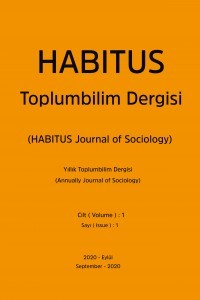MENTAL HEALTH'S STRENGTHENING IN THE PERIOD OF COVID-19
Yeni koronavirüs SARS-CoV-2'nin (Covid-19) ortaya çıkışı bir yeniliktir ve kişisel tehlike deneyimini ve belirsizlik korkusunu artıran bu bulaşıcı hastalık hakkında pek çok şey bilinmemektedir. Bu normal bir dereceye kadar normal bir tepkidir, ancak aşırı formlar belirli bir zihinsel sağlık desteğine ihtiyaç duyar. Korku, gerçek bir tehdide veya algılanan bir tehdide bir tepki olabilir - kişisel değerlendirmemize veya risk deneyimimize dayanarak varsaydığımız veya beklediğimiz ve algıladığımız bir tehdit. Panik ise yoğun veya güçlü bir korku deneyimidir. Bu nedenle korku, şiddetli kaygı veya panik ve bu konudaki davranışımız genellikle epidemiyolojik verilere dayanan gerçek riskin bir yansıması değil, kişisel risk veya tehlike deneyimimizin bir yansımasıdır. Bazıları kişisel riskin arttığını ve bazıları azaldığını algılar ve bu da davranışlarını etkiler. Salgın sırasında korku, bir dereceye kadar olası tehdit kaynaklarına odaklanmamıza ve sağlığımıza özen göstermemize yardımcı olur. Bu koronavirüs durumu kesinlikle bir kriz, özellikle de uzun sürmesi ve üzerimizde birikimli bir etkisi olması ve kriz ilişkilerine neden olması nedeniyle bir "tükenme krizi" özelliklerine sahiptir. Bu krizde bazılarının psikolojik desteğe de ihtiyacı olacaktır. Koronavirüs pandemisi ile ilgili bu özel krizde, mevcut durum ve sağlık uzmanları ve kriz merkezlerinin tavsiyeleri doğrultusunda psikolojik ilk yardım sağlanması önemlidir.
MENTAL HEALTH'S STRENGTHENING IN THE PERIOD OF COVID-19
The emergence of the new coronavirus SARS-CoV-2 (Covid- 19) is a novelty and much is unknown about this infectious disease, which increases the personal experience of danger and fear of uncertainty. This is a normal reaction to a normal extent, but excessively forms needs particular mental health support. Fear can be a reaction to an actual threat or a perceived threat- a threat that we assume or expect and perceive based on our personal assessment or experience of risk. Panic, on the other hand, is an intense or strong experience of fear. Thus, fear, severe anxiety or panic, and our behavior in this regard is often not a reflection of actual risk based on epidemiological data, but a reflection of our personal experience of risk or danger. Some perceive increased personal risk and some reduced, which then affects their behavior. Fear, during the epidemic, helps us to some extent to focus on possible sources of threat and care for our health. This coronavirus condition certainly has the characteristics of a crisis, most notably an "exhaustion crisis" because it lasts a long time and has a cumulative effect on us and causes crisis relations. In this crisis, some will also need psychological help. In this specific crisis related to the coronavirus pandemic, it is important to provide psychological first aid, in accordance with the current situation and the recommendations of health experts and the crisis headquarters.
___
- Reference1- Malouff, J.M., & Schutte, N.S. (2016). Can psychological interventions increase optimism? A meta-analysis, The Journal of Positive Psychology, 12, 594–604.
- Reference2- Carver, C. S., Scheier, M. F., & Segerstrom, S. C. (2010). Optimism. Clinical Psychology Review, 30, 879–889.
- Reference3- http://www.efpa.eu/covid-19/provision-of-online-consultation
